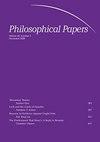Epistemic Agency Under Oppression
IF 1.3
3区 哲学
0 PHILOSOPHY
引用次数: 21
Abstract
Abstract The literature on epistemic injustice has been helpful for highlighting some of the epistemic harms that have long troubled those working in area studies that concern oppressed populations. Nonetheless, a good deal of this literature is oriented toward those in a position to perpetrate injustices, rather than those who historically have been harmed by them. This orientation, I argue, is ill-suited to the work of epistemic decolonization. In this essay, I call and hold attention to the epistemic interests of those who are epistemically marginalized on account of relations of dominance and oppression. To do so, I draw on Kristie Dotson’s work, which uses a systems approach focused on epistemic agency. I develop Dotson’s insights further to argue that epistemic inclusions may be just as pernicious as epistemic exclusions Specifically, I highlight some of the ways in which epistemic agents can be included in epistemic systems in a manner that is epistemically exploitative—extracting epistemic labor coercively or in ways that are distinctly non-reciprocal. I then turn to María Lugones’ distinction between horizontal and vertical practices to discuss avenues of resisting both exclusions and inclusions that thwart the epistemic agency of marginalized knowers.压迫下的认知能动性
关于认知不公的文献有助于突出一些长期困扰那些关注被压迫人口的区域研究工作者的认知危害。尽管如此,这些文学作品中有很多都是针对那些处于不公正地位的人,而不是那些在历史上受到不公正伤害的人。我认为,这种取向不适合认识上的非殖民化工作。在这篇文章中,我呼吁并关注那些由于统治和压迫的关系而在知识上被边缘化的人的知识利益。为了做到这一点,我借鉴了克里斯蒂·多森(Kristie Dotson)的工作,它使用了一种专注于认知代理的系统方法。我进一步发展了多森的见解,认为知识包容可能和知识排斥一样有害。具体来说,我强调了一些知识主体可以以一种知识剥削的方式被包括在知识体系中——强制抽取知识劳动,或者以一种明显非互惠的方式。然后,我转向María lugoones对水平和垂直实践的区分,讨论抵制排斥和包容的途径,这些排斥和包容阻碍了边缘化知识者的认知代理。
本文章由计算机程序翻译,如有差异,请以英文原文为准。
求助全文
约1分钟内获得全文
求助全文
来源期刊

Philosophical Papers
PHILOSOPHY-
CiteScore
2.10
自引率
0.00%
发文量
18
期刊介绍:
Philosophical Papers is an international, generalist journal of philosophy edited in South Africa Original Articles: Articles appearing in regular issues are original, high-quality, and stand-alone, and are written for the general professional philosopher. Submissions are welcome in any area of philosophy and undergo a process of peer review based on initial editor screening and refereeing by (usually) two referees. Special Issues: Topic-based special issues are comprised of both invited and submitted papers selected by guest editors. Recent special issues have included ''Philosophy''s Therapeutic Potential'' (2014, editor Dylan Futter); ''Aging and the Elderly'' (2012, editors Tom Martin and Samantha Vice); ''The Problem of the Criterion'' (2011, editor Mark Nelson); ''Retributive Emotions'' (2010, editor Lucy Allais); ‘Rape and its Meaning/s’ (2009, editor Louise du Toit). Calls for papers for upcoming special issues can be found here. Ideas for future special issues are welcome.
 求助内容:
求助内容: 应助结果提醒方式:
应助结果提醒方式:


